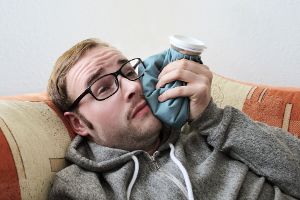What To Do & Avoid After Wisdom Tooth Extraction

Removing wisdom teeth is a common and often necessary dental procedure. Your dentist may do it herself, or she may refer you to an oral surgeon. Even if it’s a routine procedure, it can still be nerve-wracking for patients, especially if you’ve never had surgery. To help put your mind at ease, here are ten tips on what you should do and avoid after a wisdom tooth extraction.
- Apply Ice & Heat
- What To Eat After Oral Surgery
- Food & Drinks To Avoid
- No Straws
- Exercise & Massage Your Jaw
- How To Manage Pain
- Follow All Home Aftercare Directions
- Brushing Too Harshly & Too Soon
- Pause Tobacco Use
- Don’t Stay Quiet If You Don’t Feel Right
Hot & Cold Compresses Reduce Painful Swelling
Swelling around the mouth, cheeks, and eyes is a common reaction and usually goes away in two or three days. Some patients also bruise, which take up to a week to resolve. Use an ice pack as directed by your dentist to reduce bruising and inflammation. For pain and soreness, switch the ice pack out for moist heat.
What Foods Are Safe To Eat & Drink After Oral Surgery?
After your surgery, aim to drink five or six glasses of fluids a day. You should also adopt a diet of soft foods during your recovery, like the ones listed below. Stick with the liquid options, like soups and smoothies, for the first 24 hours, and branch out to the rest of the list when your jaw can tolerate them. If you don’t skip a meal, you’ll heal faster and feel stronger.
- Soups & Broths
- Yogurt
- Applesauce
- Mashed Potatoes
- Jell-O
- Scrambled Eggs
- Smoothies
- Pudding
- Ice Cream
- Pasta
- Instant Oatmeal
Which Food & Drinks Should I Avoid?
You should avoid eating the following foods until your dentist tells you it’s safe to return to your normal diet. Hard-to-chew foods can strain your jaw, and hot drinks irritate the wound. Crunchy food can re-open stitches, get trapped in the empty socket, and delay healing. You also shouldn’t drink alcohol during your recovery since it’s likely to interact negatively with the medicine you’ll be taking.
- Chips & Pretzels
- Nuts
- Popcorn
- Seeds
- Hard Grains, Like Rice & Quinoa
- Jerky
- Chewy & Sticky Candy
- Acidic Foods, Like Raw Tomatoes & Citrus Juice
- Spicy Foods
Using Straws Can Stop Healing & Delay Recovery
Wait to drink through a straw for at least a week after you have your wisdom teeth removed. A blood clot will form over the extraction site as your body heals. That blood clot must remain in place so your mouth can fully heal. Using a straw creates suction that can dislodge the clot, restart bleeding, and delay your recovery.
Gently Move Your Jaw & Massage The Muscles
Many people experience little or no pain after surgery. However, your jaw will likely feel stiff and sore for a few days. Exercise it by gently opening and closing your mouth to ensure it keeps moving as it should. You can also use your fingers to massage your jaw muscles, loosening them up and relieving tension.
Avoid Pain With Over-The-Counter Meds
If you have pain after surgery, take medicine as soon as you start to feel bad. Over-the-counter pain relievers like Tylenol (acetaminophen) and Motrin (ibuprofen) are enough for some patients. Your surgeon may prescribe stronger pain medication if your procedure is more involved. Take all medications as directed, and your pain should decrease each day.
Don’t Ignore Your Surgeon’s Aftercare Instructions
It can’t be overstated how important it is to follow all of your surgeon’s aftercare instructions to ensure a faster, smoother recovery. The schedule for your prescribed antibiotics and pain medicine are critical details to note. If you ignore these directions, you could endure more pain and be at greater risk for infections.
Wait To Brush Or Floss—Then Go Gently
You shouldn’t brush your teeth, use mouthwash, or spit excessively during the first 24 hours after surgery. Instead, gently swish warm salt water around your mouth to rinse it after meals and as often as your dentist recommends. Most dentists tell their patients to return to normal brushing after the first day. However, do so gently in the beginning, especially around your surgical wounds, to keep blood clots intact.
Avoid Tobacco Products While Your Mouth Heals
Continuing tobacco habits immediately after oral surgery can delay a full recovery and increase your risk of developing complications. It’s commonly recommended to stop smoking for 72 hours and stop chewing tobacco for a week. Your surgeon may recommend pausing tobacco use for longer to allow your mouth to heal completely.
Speak Up If Something Feels Wrong
Don’t be afraid to talk to your dentist or oral surgeon about any concerns you have about your wisdom teeth. If you develop any of the following symptoms after surgery, contact your surgeon or dentist immediately. These symptoms could be signs of nerve damage, infection, or another complication. It’s better to catch complications early so they don’t worsen and require more extensive treatment.
- Ear Pain
- Severe Pain That Medicine Doesn’t Relieve
- Seeing Blood Or Pus When You Blow Your Nose
- Pus Oozing From Socket
- Difficulty Breathing Or Swallowing
- Persistent Numbness
- Persistent Or High Fever
- Excessive Bleeding
- Swelling, Which Worsens After 2-3 Days
- Bad Taste In Your Mouth That Saltwater Doesn’t Rinse Away
We Can Make Sure Your Dental Surgery Goes Smoothly
Most patients only take a few days to bounce back to normal after they get their wisdom teeth removed. Still, your mouth may take a few weeks to heal completely. With preparation and planning, you can settle your pre-surgery anxieties and prioritize your recovery. If you’re in the San Ramon, CA, area and need dental care from wisdom tooth removal to a routine checkup, book an appointment with the office of Dr. Carol Jin, DDS, today.



